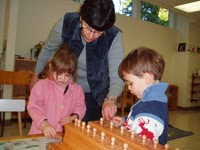But how does one become an intelligent helper/guide/teacher and, at the same time, remove obstacles from a young child’s learning? By establishing a strong personal guidance philosophy that is reflected in one’s interactions with children, parents, other childcare professionals and the classroom environment.

My own personal guidance philosophy begins with respect for the child. In order to respect the child, we must know the child and in order to know the child, we must learn to observe the child. If we carefully observe children’s behaviour and interests, their ability to move and take on new tasks, their need to feel secure and relaxed in their environment, we can get many clues as to growth and development. If we can follow children’s clues to their needs and abilities and do our best to provide an environment that satisfies these, children will grow confident that they are accepted for who they are and not expected to fulfill another’s schedule for development.
Punishment and reward have no place in a philosophy that strives to respect and follow the child. Punishment, whether physical or otherwise, implies dominance. The use of natural and logical consequences is a far better way for children to learn responsibility for their actions. Rewards teach greed and remove the self-satisfaction felt by a job well done. Something as innocuous as a smile can instantly rob a child of the deep contentment felt by achieving a task, if that smile is perceived as a reward. Encouragement is a far more effective guidance strategy.
Ensuring success is another way to respect the children in the classroom. This is achieved through age appropriate, open-ended activities and a non-competitive classroom atmosphere. Open-ended activities allow children to express themselves creatively and ensure success because there is no right or wrong. A non-competitive atmosphere allows every child to work according to their own skill level and progress at their own rate.
Finally, I believe in constant and continual professional development. Attending conferences, workshops and retreats can give one new strategies and information, renew flagging commitment, and refresh one’s understanding of child development. Even taking part in on-line forums contributes to my commitment to learning as much as I can about guidance and childcare.

In conclusion, following the child involves deep respect, constant observation, a properly prepared environment which caters to the developmental needs of the children, guidance strategies that do not involve rewards or punishments, an understanding of the many systems that influence a child’s world, and on-going renewal of the teaching spirit. I found it very prophetic that in Dr. Wayne W. Dyer’s (no relation) perpetual calendar page for the day I wrote this essay, is the quote “Your children are spiritual beings who come through you, not for you.” Words to contemplate.
No comments:
Post a Comment